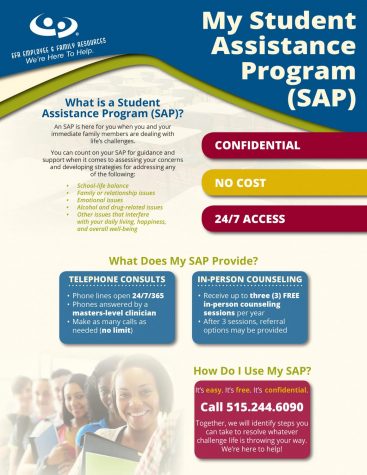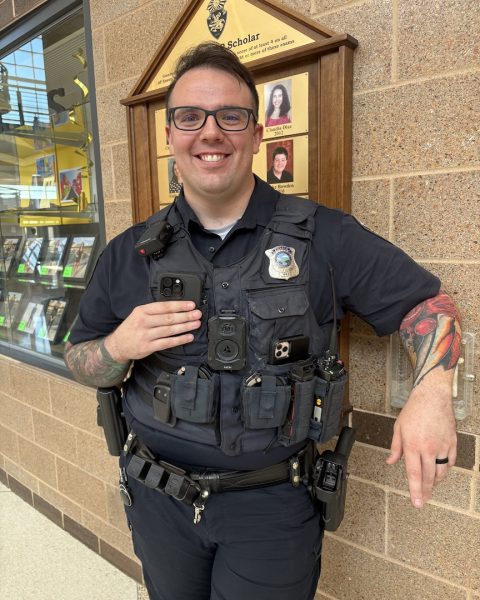Bringing Awareness to Mental Health
September is National Mental Health Awareness Month
September is National Mental Health Awareness Month, and as teens, we can all feel stressed and a little depressed about our lives, especially during this time. It’s time to be educated on mental health: the signs of a problem, the science, and the counseling options.
While there are a wide variety of mental health disorders, the most common ones, according to Employee and Family Resources’ Counselor Emily Crabtree, are depression and anxiety.
Depression has a wide variety of red flags, according to www.healthychildren.org. The most notable symptoms are excessive moodiness, abandonment of friends or social groups, and paranoia. Crabtree listed other red flags that you can see in yourself.
“Withdrawal from your normal activities, thoughts of suicide, loss of or low energy, and feelings of worthlessness,” Crabtree said.
Signs of anxiety can be recognized with excessive worrying, irritability, and difficulty concentrating. And while everyone experiences anxiety, some experience overwhelming and constant symptoms that impact everyday life, which is considered an anxiety disorder, according to nami.org.
Knowing the warning signs and finding them is one thing, getting help after is what’s difficult. Admitting to having a mental illness doesn’t come easy to some people, and getting help can be difficult as well. But counseling can be very beneficial.
“There’s nothing to be ashamed of, and there’s nothing wrong with you because there’s something going on with your mental health,” Crabtree said. “If you had a broken arm, you would see the right doctor to help you get better, it’s the same way for your mental health, counselors are there to help. Counseling is a place where you have an unbiased person there to listen and help you get through tough times.”
Every counseling session is very different because it’s based entirely on what that specific person needs, but there is one overall similarity.
“You would definitely go over your goals about what you want to do in counseling and what you want to get out of it, and what you want the end result to be and what steps you can take to get there,” Crabtree said.
Through SEP, students can contact EFR through their Student Assistance Program (SAP). SAP allows SEP students and family to get three free sessions with a counselor. SAP also has a 24/7, 365 call line.

While society has come a long way in terms of accepting mental health, there are still obstacles when it comes to getting help. If your family cannot afford counseling, or if insurance doesn’t pay for it, many locations offer sliding scale fees that are based on income. If your family is against counseling, Crabtree recommends going to a trusted adult or school counselor to help talk to your guardians about it.
Panic and anxiety attacks are also a common issue for high school aged students. The two attacks are very similar when it comes to the feeling, and the physical toll, but there it’s one key difference. According to healthline.com, the source of anxiety attacks can usually be based on a stressful factor in a person’s life. They can also be subdued and more under the radar. Panic attacks, however, are more out of the blue, and a lot harder to control. They also have no identifiable source for why it happened.
Many think counseling is just for those who struggle with mental illnesses, but it can also be to help learn tactics when it comes to time management with school, and going over other stressors in life, such as COVID-19.
Sophomore Taylor Soung goes to counseling to help with school and extracurriculars.
“School causes me a lot of stress because of all the pressure put on me with tests and stuff,” Soung said. “My mental health kind of consumes me because of this stress.”
Aside from counseling, Soung copes with her mental health by journaling, listening to music and reading, and talking to her trusted friends.
“My friends are very supportive, they will listen to what I have to say and encourage me to keep fighting through it, I have a big support system,” Soung said.
In life, we are bound to come across people dealing with mental issues, whether it be a silent battle with depression, or a public panic attack. But how should you help?
“The best thing you can do is to educate yourself,” Soung said. “Even though it’s not everyone’s favorite thing to be educated on, it’s better to have knowledge of it to better help those who struggle with mental illnesses.”
Your donation will support the student journalists of Southeast Polk High School. Your contribution will allow us to purchase equipment and cover our annual website hosting costs.











Jim Hegg • Sep 28, 2020 at 9:50 pm
Great article, Brynn, Well documented and written. Gramps is very proud of you. LU